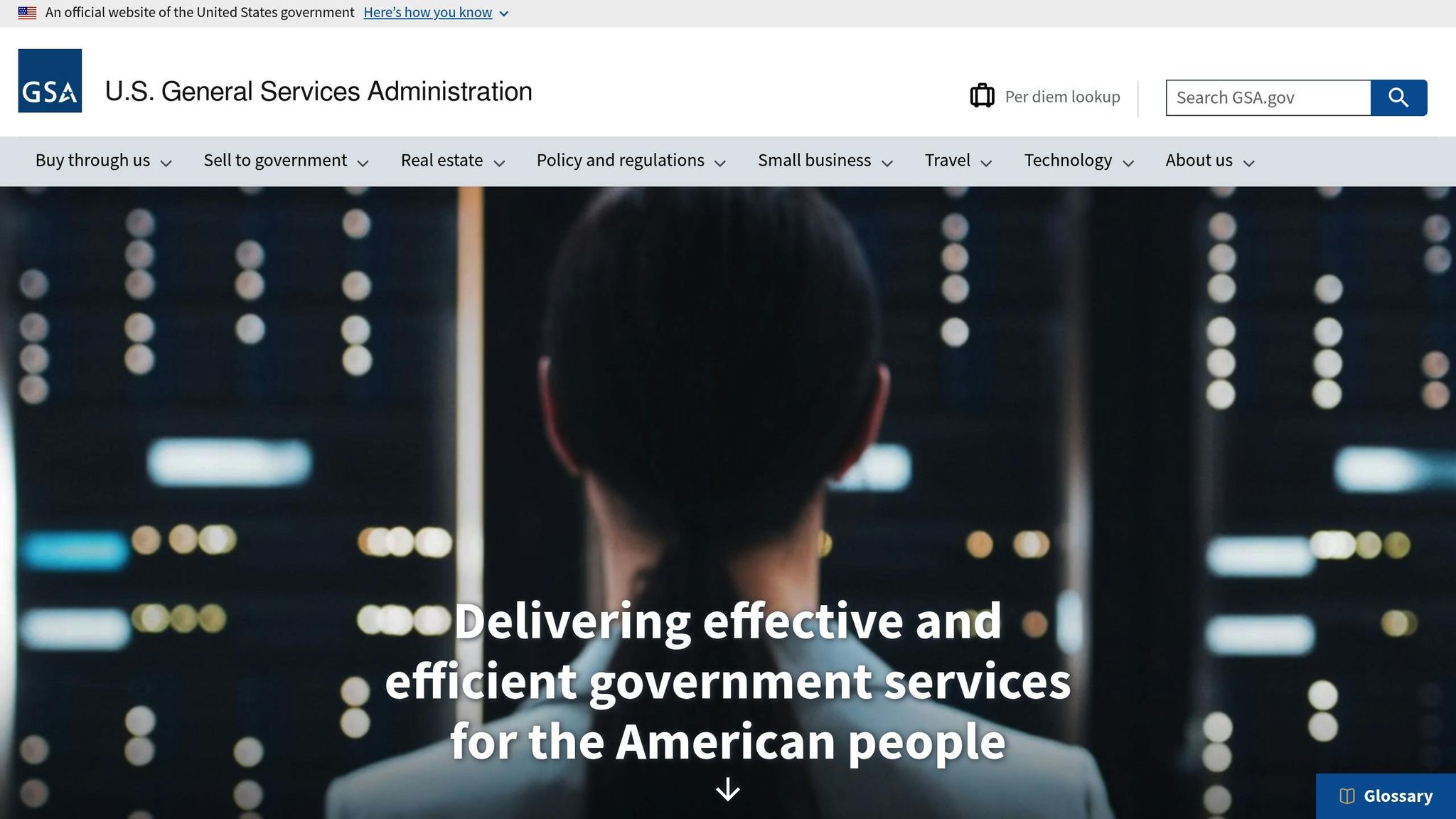Securing a GSA IT Services contract can streamline how businesses connect with government buyers. To qualify, your company must meet specific criteria, including financial stability, proven sales history, and compliance with federal regulations. Here’s a quick breakdown:
- Business Requirements: At least 2 years of operational history and a strong financial standing (Debt-to-Equity Ratio below 0.7, Current Ratio above 1.0).
- Sales History: Your offerings must already be available commercially, supported by invoices and sales records. Pricing must comply with the "Most Favored Customer" rule.
- Federal Compliance: Register on SAM.gov, adhere to the Trade Agreements Act (TAA), and maintain ethical practices. Service providers must also meet labor qualifications and cybersecurity standards.
- IT-Specific Needs: Align your services with designated Special Item Numbers (SINs), and ensure your team can handle federal contract requirements, including reporting and security clearances.
Only about 15% of applicants succeed initially, but programs like the Springboard Program can help newer businesses qualify. Meeting these standards ensures your readiness for federal IT contracts while opening doors to valuable opportunities.
Doing Business with GSA – Roadmap Getting on Contract

Basic Eligibility Requirements for GSA IT Services
Securing a GSA IT Services contract means meeting specific criteria that establish your business’s financial stability and market readiness.
Business Operations and Financial Requirements
To qualify, businesses must have a minimum of two years of operational history with documented revenue. This ensures the company has a proven track record of active operations.
Financial stability is another key factor. The GSA evaluates this using two metrics: a Debt-to-Equity Ratio below 0.7 and a Current Ratio above 1.0. These benchmarks help determine whether a business can sustain its commitments. It’s worth noting that only about 15% of the 10,000 annual applicants receive initial approval. For startups or companies with limited history, the Springboard Program offers an alternative pathway, provided they can demonstrate strong growth potential.
These financial and operational criteria lay the groundwork for further evaluation of a company’s commercial viability.
Commercial Sales History
To qualify, your offerings must already be available in the commercial market. This ensures they’ve been tested and proven viable. Vendors are required to submit supporting documentation, like invoices and sales records, to show that their products or services have been sold to private-sector customers. Interestingly, over 20% of applications are rejected because the offerings are deemed non-commercial, particularly in niche markets.
Additionally, the "Most Favored Customer" rule requires vendors to offer the government pricing that’s at least as favorable as their best commercial rates. Companies can either document these sales practices or opt into Transactional Data Reporting for specific SINs (Special Item Numbers).
With a solid sales history and compliant pricing, businesses must then navigate federal compliance standards.
Federal Compliance Standards
Compliance with federal regulations is non-negotiable for GSA contractors. The journey starts with registering on SAM.gov (System for Award Management). This registration must stay active and be renewed annually for the duration of the contract.
Contractors must also adhere to the Trade Agreements Act (TAA), especially when providing IT products. This ensures that items are either manufactured in or substantially transformed within designated countries. Additionally, businesses must maintain ethical practices, hold the necessary licenses, and have a clean compliance record.
For service providers, demonstrating labor qualifications is essential. Companies need to prove their team’s expertise through certifications, experience, and professional competence to meet federal standards.
After approval, maintaining compliance is an ongoing requirement. Vendors must generate at least $25,000 in government sales annually to keep their GSA Schedule active. Falling short could result in contract cancellation.
Specific Requirements for GSA IT Services
Beyond meeting basic eligibility, federal IT contracts come with additional requirements tailored to the complexities of government projects.
IT Categories and SINs Alignment
To secure a GSA IT contract, your services must align with the government’s designated service categories, organized under Special Item Numbers (SINs). These SINs specify the types of IT services the government can procure. For example, if your expertise includes IT professional services, telecommunications, or custom software development, ensure your offerings match the appropriate SIN. You’ll need to provide documentation for labor categories, certifications, and evidence of your technical capabilities to handle projects of varying scales.
Federal Contract Support Capabilities
Federal IT projects require more than technical know-how – they demand a solid administrative foundation. Your team must be familiar with acquisition regulations, manage contract modifications, handle option years, and meet reporting deadlines. Having personnel with security clearances – or those eligible to obtain them – can open more doors to opportunities. Additionally, managing controlled data and complying with federal cybersecurity standards are non-negotiable aspects of supporting government projects.
Pricing and Documentation Standards
Clear and detailed pricing documentation is essential for GSA IT contracts. Your pricing strategy should outline labor categories, hourly rates, and any volume-based or discount pricing structures. It’s also crucial to benchmark these rates against commercial pricing to demonstrate competitiveness. When submitting technical proposals, include comprehensive details about your team’s qualifications, certifications, and relevant past projects. Don’t forget to factor in federal-specific costs, such as compliance and security requirements, to ensure your pricing remains both competitive and profitable.
sbb-itb-8737801
Common Reasons Businesses Don’t Qualify
Knowing why applications are rejected can save businesses from common mistakes that might jeopardize their chances of securing GSA IT Services contracts. Even companies with solid offerings often trip up on basic requirements, like having a limited commercial sales history, which can derail the entire process.
Limited Business History or Sales
One of the biggest obstacles to GSA qualification is a lack of commercial sales history. The GSA requires that your products or services are already commercially available to ensure competitive pricing. A strong sales record is crucial for establishing what the GSA calls "fair and reasonable pricing" for government contracts. Without this history – specifically from direct sales rather than custom projects or referrals – there’s no way for evaluators to confirm that your pricing holds up in a competitive market. This makes it hard for the GSA to trust that your offerings can meet the demands of large-scale government orders.
To improve your chances, focus on building a solid track record of commercial sales. Develop direct customer relationships, keep detailed sales documentation, and ensure your pricing aligns with market standards before submitting your GSA application.
How GSA Focus Helps Small Businesses

For small businesses, the maze of GSA documentation and compliance can feel like an uphill battle. That’s where GSA Focus steps in, offering tailored support to simplify the process. From navigating the GSA Schedule application to managing contracts and providing strategic guidance, GSA Focus ensures small businesses can focus on what they do best while leaving the complexities of federal contracting to the experts.
Application Process Support
Tackling the paperwork involved in GSA applications is no small feat. GSA Focus takes on 95% of the documentation workload, saving businesses more than 100 hours of effort. This means small business owners don’t need to become GSA regulation experts or spend months deciphering federal contracting rules.
GSA Focus handles the entire document preparation process, ensuring everything is compliant and ready to go. Plus, their secure online platform makes it easy for businesses to upload documents and track progress. This streamlined system not only reduces administrative headaches but also adheres to the strict security requirements of federal contracts.
Contract Management and Support
Getting a GSA contract is just the beginning. Maintaining it requires ongoing effort, and GSA Focus is there every step of the way. They negotiate favorable terms, handle contract modifications, and ensure businesses stay compliant with GSA standards. Their support covers everything from managing reporting obligations to addressing changes throughout the contract’s lifecycle.
Why Choose GSA Focus?
With a 98% success rate and a refund guarantee, GSA Focus gives small businesses peace of mind and measurable results. Their expertise doesn’t stop at securing contracts – they also provide guidance on how to qualify and optimize contracts, helping businesses save time and improve their overall performance.
Summary
Securing GSA IT Services contracts means meeting specific business, financial, and technical standards that prove your ability to effectively serve federal agencies. Understanding these requirements upfront can help avoid delays and make the application process smoother.
Key Eligibility Requirements
To qualify, your business must showcase a solid commercial track record and stable operations, backed by thorough financial documentation. These elements demonstrate your readiness to handle federal contracts.
Staying compliant with federal regulations is equally important. This includes maintaining up-to-date registrations, obtaining necessary clearances, and adhering to cybersecurity guidelines. Your IT services must also align with the appropriate GSA Special Item Numbers (SINs) to meet contract requirements.
Accuracy in your paperwork is critical. Pricing structures should follow GSA guidelines, commercial price lists need proper formatting, and past performance records must detail references to previous federal contracts.
Meeting these criteria can be complex, but expert support can make the process far more manageable.
Getting Expert Help
Navigating the GSA Schedule process can feel overwhelming, thanks to the extensive documentation and intricate regulations. That’s where GSA Focus steps in. They handle the bulk of the paperwork, allowing you to concentrate on running your business. With a 98% success rate and a refund guarantee, GSA Focus provides end-to-end services – from assessing your qualifications to securing the contract and managing it afterward. Their expertise reduces common risks and simplifies the entire journey.
FAQs
What challenges do businesses face when qualifying for GSA IT Services, and how can they address them?
Businesses aiming to qualify for GSA IT Services often face a few key hurdles. These include dealing with intricate compliance rules, ensuring precise and thorough documentation, and adhering to specific pricing and contract standards.
Overcoming these challenges requires staying up-to-date on GSA regulations, carefully preparing all necessary documents, and maintaining compliance every step of the way. Partnering with experts who understand the process can also make it easier to secure and manage GSA Schedule contracts efficiently.
How does the ‘Most Favored Customer’ rule impact pricing for GSA IT Services contracts?
The Most Favored Customer (MFC) rule ensures that businesses seeking GSA IT Services contracts provide the government with pricing that matches or beats the best deal they offer to their top commercial customers. This rule isn’t about slashing prices to rock-bottom levels but about ensuring fairness and staying competitive.
To meet this requirement, vendors need to carefully evaluate their pricing strategies. They must ensure their GSA rates either match or surpass the terms they offer to their best commercial clients. The challenge lies in striking a balance – offering competitive prices that satisfy government standards while still protecting profitability.
How can new businesses qualify for a GSA IT Services contract through the Springboard Program?
New businesses looking to secure a GSA IT Services contract can take advantage of the Springboard Program, which is designed to help companies with less than two years of operation prove their potential. One effective approach is to emphasize the expertise of your team or any affiliated companies, showcasing their track record and skills to demonstrate your capability.
To boost your chances, make sure your services align with GSA’s listed categories and conduct a thorough readiness assessment to ensure you meet all GSA requirements. Highlighting key factors such as financial stability, strong ethics, and relevant past performance can further enhance your application. By taking these steps, even newer businesses can position themselves to meet the program’s standards and stand out in the competitive landscape.
Related posts
- How To Qualify for a GSA Schedule
- Who Qualifies for a GSA Schedule?
- GSA Contract Eligibility: Key Requirements
- Your Complete Guide to GSA Contractors


